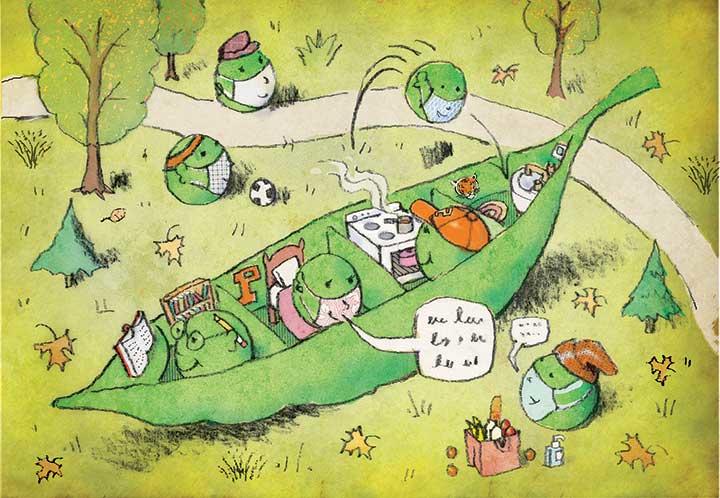
As the pandemic nixed Princeton students’ plans for an on-campus fall, many have opted to quarantine together, forming pods across the country in an effort to salvage some semblance of college life. Several clusters of students are residing near the University, with others setting up house in big cities, small towns, and even on islands.
While living with peers provides a welcome reprieve from the stressors of isolated college life, pandemic-era safety procedures have changed the way roommates establish house rules.
Soon after signing a yearlong lease on their Princeton house, Francesca Walton ’21 and her six roommates created a set of safety guidelines: Wear a mask outside of the house at all times. Avoid groups of more than 10 people. Wash your hands as soon as you enter the house. Make sure guests who visit have been tested recently. And if a meeting must take place indoors, be even more cautious with mask-wearing and social distancing.
It’s been uncomfortable at times, Walton explained, as when a roommate had to be reminded to wear a mask. But open discussion and detailed rules, typed up and taped to the fridge, have helped Walton’s pod stay safe and develop plans about what to do if something does go wrong.
“We have done a great job at communicating our concerns and making sure that everyone is on board,” she said. “If someone doesn’t feel good about a certain situation, we talk it out.”
During an average day, Walton and her housemates attend online classes from their house, congregating for meals and conversation around the dinner table in the evenings. Occasionally, they set up a picnic on the largely empty green in front of Nassau Hall, which helps to “restore some sense of senior year.”
“Even though we are not allowed in any Princeton buildings, it is comforting to walk around campus,” she said.
For Annika Browne ’24, the pod experience is her first time living away from home. Instead of spending her freshman fall studying in Firestone Library, she is experiencing Princeton alongside two roommates in Boston.
“As a first-year, I thought it would be helpful to be around other Princeton students to help get adjusted,” Browne said. “I wanted to meet more students to try to make the best of the semester, and I found it difficult to focus at my house when my senior year [of high school] went online.”
Several cited academic concerns as reasons for living with other students. Scott Overbey ’21 noted that a key motivation for renting a house with five other seniors in Fort Lee, New Jersey, was to create a productive workspace with others who were experiencing the same demands of senior year, like writing a thesis and interviewing for jobs. One benefit: “commiserating about work” with friends — a true Princeton pastime unable to be replicated at a distance.
For Sophie Blue ’21, leaving home to live with nine friends on Fire Island, New York, has given her a support system to cope with the stress of Princeton. “I’ve been so much more productive here because I am able to obtain a much healthier balance of academics and socializing,” she said. “That balance is truly key at Princeton but is almost impossible when alone at home.”
Most students had lengthy conversations about safety and lifestyle before arriving in their pod. Blue’s and Browne’s groups agreed to get tested before traveling, and those who flew to New York to join Blue’s pod quarantined elsewhere before joining the group on Fire Island.
In Fort Lee, Overbey and his housemates take turns getting tested, on a rotating schedule, while continuing to wear masks outside of the house. “Some housemates had different expectations of going out to restaurants or seeing people at first, but we’re all on the same page now,” he said. “Beyond that, we don’t go out and about unless we find it necessary, and we’ll obviously wear masks and wash our hands.”
Despite the challenges of navigating COVID-19 safety away from home, many students have found pod living to be well worth the hassle.
“We are living in a crazy world, but living in a house with some of my closest friends has been really special,” said Walton. “It’s been a silver lining.”











0 Responses